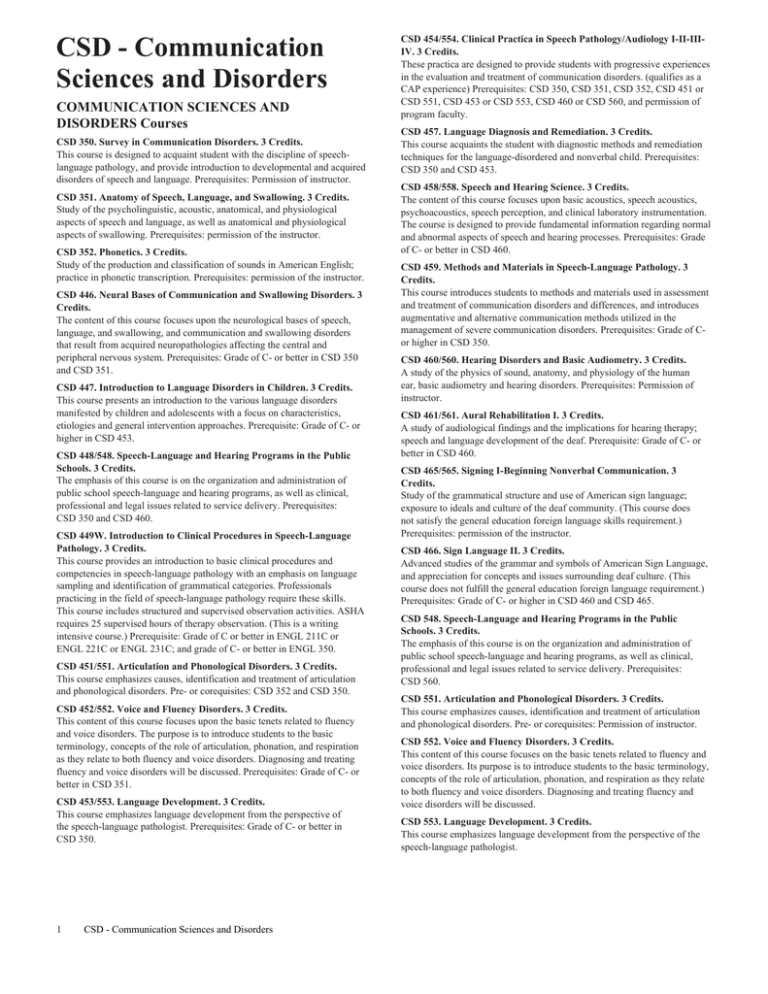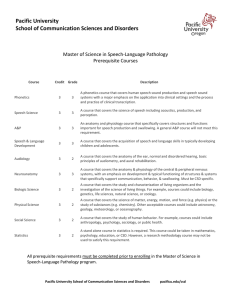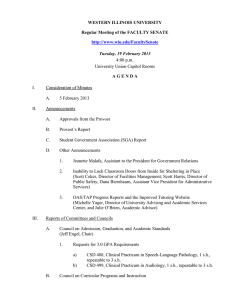CSD - Communication Sciences and Disorders
advertisement

CSD - Communication Sciences and Disorders COMMUNICATION SCIENCES AND DISORDERS Courses CSD 350. Survey in Communication Disorders. 3 Credits. This course is designed to acquaint student with the discipline of speechlanguage pathology, and provide introduction to developmental and acquired disorders of speech and language. Prerequisites: Permission of instructor. CSD 351. Anatomy of Speech, Language, and Swallowing. 3 Credits. Study of the psycholinguistic, acoustic, anatomical, and physiological aspects of speech and language, as well as anatomical and physiological aspects of swallowing. Prerequisites: permission of the instructor. CSD 352. Phonetics. 3 Credits. Study of the production and classification of sounds in American English; practice in phonetic transcription. Prerequisites: permission of the instructor. CSD 446. Neural Bases of Communication and Swallowing Disorders. 3 Credits. The content of this course focuses upon the neurological bases of speech, language, and swallowing, and communication and swallowing disorders that result from acquired neuropathologies affecting the central and peripheral nervous system. Prerequisites: Grade of C- or better in CSD 350 and CSD 351. CSD 447. Introduction to Language Disorders in Children. 3 Credits. This course presents an introduction to the various language disorders manifested by children and adolescents with a focus on characteristics, etiologies and general intervention approaches. Prerequisite: Grade of C- or higher in CSD 453. CSD 448/548. Speech-Language and Hearing Programs in the Public Schools. 3 Credits. The emphasis of this course is on the organization and administration of public school speech-language and hearing programs, as well as clinical, professional and legal issues related to service delivery. Prerequisites: CSD 350 and CSD 460. CSD 449W. Introduction to Clinical Procedures in Speech-Language Pathology. 3 Credits. This course provides an introduction to basic clinical procedures and competencies in speech-language pathology with an emphasis on language sampling and identification of grammatical categories. Professionals practicing in the field of speech-language pathology require these skills. This course includes structured and supervised observation activities. ASHA requires 25 supervised hours of therapy observation. (This is a writing intensive course.) Prerequisite: Grade of C or better in ENGL 211C or ENGL 221C or ENGL 231C; and grade of C- or better in ENGL 350. CSD 451/551. Articulation and Phonological Disorders. 3 Credits. This course emphasizes causes, identification and treatment of articulation and phonological disorders. Pre- or corequisites: CSD 352 and CSD 350. CSD 452/552. Voice and Fluency Disorders. 3 Credits. This content of this course focuses upon the basic tenets related to fluency and voice disorders. The purpose is to introduce students to the basic terminology, concepts of the role of articulation, phonation, and respiration as they relate to both fluency and voice disorders. Diagnosing and treating fluency and voice disorders will be discussed. Prerequisites: Grade of C- or better in CSD 351. CSD 453/553. Language Development. 3 Credits. This course emphasizes language development from the perspective of the speech-language pathologist. Prerequisites: Grade of C- or better in CSD 350. 1 CSD - Communication Sciences and Disorders CSD 454/554. Clinical Practica in Speech Pathology/Audiology I-II-IIIIV. 3 Credits. These practica are designed to provide students with progressive experiences in the evaluation and treatment of communication disorders. (qualifies as a CAP experience) Prerequisites: CSD 350, CSD 351, CSD 352, CSD 451 or CSD 551, CSD 453 or CSD 553, CSD 460 or CSD 560, and permission of program faculty. CSD 457. Language Diagnosis and Remediation. 3 Credits. This course acquaints the student with diagnostic methods and remediation techniques for the language-disordered and nonverbal child. Prerequisites: CSD 350 and CSD 453. CSD 458/558. Speech and Hearing Science. 3 Credits. The content of this course focuses upon basic acoustics, speech acoustics, psychoacoustics, speech perception, and clinical laboratory instrumentation. The course is designed to provide fundamental information regarding normal and abnormal aspects of speech and hearing processes. Prerequisites: Grade of C- or better in CSD 460. CSD 459. Methods and Materials in Speech-Language Pathology. 3 Credits. This course introduces students to methods and materials used in assessment and treatment of communication disorders and differences, and introduces augmentative and alternative communication methods utilized in the management of severe communication disorders. Prerequisites: Grade of Cor higher in CSD 350. CSD 460/560. Hearing Disorders and Basic Audiometry. 3 Credits. A study of the physics of sound, anatomy, and physiology of the human ear, basic audiometry and hearing disorders. Prerequisites: Permission of instructor. CSD 461/561. Aural Rehabilitation I. 3 Credits. A study of audiological findings and the implications for hearing therapy; speech and language development of the deaf. Prerequisite: Grade of C- or better in CSD 460. CSD 465/565. Signing I-Beginning Nonverbal Communication. 3 Credits. Study of the grammatical structure and use of American sign language; exposure to ideals and culture of the deaf community. (This course does not satisfy the general education foreign language skills requirement.) Prerequisites: permission of the instructor. CSD 466. Sign Language II. 3 Credits. Advanced studies of the grammar and symbols of American Sign Language, and appreciation for concepts and issues surrounding deaf culture. (This course does not fulfill the general education foreign language requirement.) Prerequisites: Grade of C- or higher in CSD 460 and CSD 465. CSD 548. Speech-Language and Hearing Programs in the Public Schools. 3 Credits. The emphasis of this course is on the organization and administration of public school speech-language and hearing programs, as well as clinical, professional and legal issues related to service delivery. Prerequisites: CSD 560. CSD 551. Articulation and Phonological Disorders. 3 Credits. This course emphasizes causes, identification and treatment of articulation and phonological disorders. Pre- or corequisites: Permission of instructor. CSD 552. Voice and Fluency Disorders. 3 Credits. This content of this course focuses on the basic tenets related to fluency and voice disorders. Its purpose is to introduce students to the basic terminology, concepts of the role of articulation, phonation, and respiration as they relate to both fluency and voice disorders. Diagnosing and treating fluency and voice disorders will be discussed. CSD 553. Language Development. 3 Credits. This course emphasizes language development from the perspective of the speech-language pathologist. CSD 554. Clinical Practica in Speech Pathology/Audiology I-II-III-IV. 3 Credits. These practica are designed to provide students with experiences in the evaluation and treatment of communication disorders. (qualifies as a CAP experience) Prerequisites: CSD 350, CSD 351, CSD 451 or CSD 551, CSD 453 or CSD 553, CSD 460 or CSD 560, and permission of program faculty. CSD 558. Speech and Hearing Science. 3 Credits. The content of this course focuses upon basic acoustics, speech acoustics, psychoacoustics, speech perception, and clinical laboratory instrumentation. The course is designed to provide fundamental information regarding normal and abnormal aspects of speech and hearing processes. Prerequisites: Grade of C- or better in CSD 460 or CSD 560. CSD 560. Hearing Disorders and Basic Audiometry. 3 Credits. A study of the physics of sound, anatomy, and physiology of the human ear, basic audiometry and hearing disorders. CSD 561. Aural Rehabilitation I. 3 Credits. A study of audiological findings and the implications for hearing therapy; speech and language development of the deaf. CSD 565. Signing I-Beginning Nonverbal Communication. 3 Credits. Study of the grammatical structure and use of American sign language; exposure to ideals and culture of the deaf community. (This course does not satisfy the general education foreign language skills requirement.) Prerequisites: permission of the instructor. CSD 612. Evidence-Based Research in Speech-Language Pathology. 3 Credits. This course will provide students with a background in research design by examining elements of quality research methods. Students will learn how to identify reputable research outcomes that influence clinical decisions in speech-language pathology. CSD 649. Clinical Procedures in Speech-Language Pathology. 3 Credits. This course teaches students basic clinical procedures and competencies in speech-language pathology with an emphasis on language sampling and identification of grammatical categories, skills required by professionals practicing in the field of speech-language pathology. Prerequisites: Permission of instructor. CSD 651. Language Development and Language Disorders. 3 Credits. Lecture 3 hours; 3 credits. Prerequisite: CSD 553 or equivalent, or permission of the instructor. This course provides a detailed analysis of current literature pertinent to language development, diagnosis and intervention. CSD 658. Swallowing Disorders. 3 Credits. Lecture 3 hours; 3 credits. This course reviews the structures and neural bases of swallowing, common etiologies that cause dysphagia, and clinical techniques used in assessment and management of swallowing disorders in pediatric and adult populations. CSD 659. Augmentative and Alternative Communication Disorders. 3 Credits. The purpose of this course is to identify populations that may benefit from AAC, to describe the assessment process relative to AAC, to describe tenants of intervention, to provide information regarding legal issues related to AAC and to demonstrate how to acquire and use AAC instrumentation. Prerequisites: Permission of instructor. CSD 660. Procedures in Audiology. 3 Credits. Advanced study of the physics of sound, anatomy, and physiology of audition, hearing disorders, and audiometric procedures, providing knowledge and skills necessary for a speech-language pathologist. CSD 662. Cognitive-Communication Disorders. 3 Credits. The objective of this course is to investigate the etiologies, cognitive impairments, communication manifestations, diagnostic methods and therapeutic techniques related to traumatic brain injury, right hemisphere brain damage, and various dementias. Prerequisites: Permission of instructor. CSD 668. Advanced Clinical Externship in Speech-Language Pathology. 3 Credits. In this externship, students will apply advanced speech-language pathology techniques in diagnosis and intervention for individuals with communication and swallowing disorders in medical or educational settings. Students spend full time in an off-campus facility to complete clock hours for certification purposes. Pre- or corequisite: Passing grade in CSD 554, and permission of faculty. CSD 750. Neuromotor Speech Disorders. 3 Credits. The content of this course focuses on the neurological bases of speech, disorders of speech production associated with neurologic diseases, as well as methods for evaluation and treatment of those disorders. CSD 850. Neuromotor Speech Disorders. 3 Credits. The content of this course focuses upon the structural and neurological bases of speech disorders, particularly those related to laryngeal and central nervous system pathologies. Advanced expertise in neuromotor speech disorders will be developed along with in depth familiarity and analysis of related literature. CSD 652. Articulation and Phonological Disorders. 3 Credits. Lecture 3 hours; 3 credits. Prerequisite: CSD 551. The principal emphasis of this course is clinical intervention for phonological and articulation disorders including motor speech disorders. CSD 653. Language Diagnosis and Remediation. 3 Credits. This is an advanced course on the diagnostic methods and remediation techniques for the child with language disorder and the child who is nonverbal. Prerequisites: Permission of instructor. CSD 655. Voice and Resonance Disorders. 3 Credits. The purpose of this course is to investigate the etiologies, communicative disorders, diagnostic methods, and therapeutic techniques related to voice and resonance disorders. Prerequisites: Permission of instructor. CSD 656. Theories and Therapies in Stuttering. 3 Credits. Lecture 3 hours; 3 credits. This course emphasizes current etiological theories, research, diagnostic procedures and therapeutic techniques related to stuttering. CSD 657. Aphasia. 3 Credits. The objective of this course is to investigate the etiologies, communicative disorders, diagnostic methods and therapeutic techniques related to aphasia, dyslexia and dysgraphia related to acquired neurologic conditions. CSD - Communication Sciences and Disorders 2

